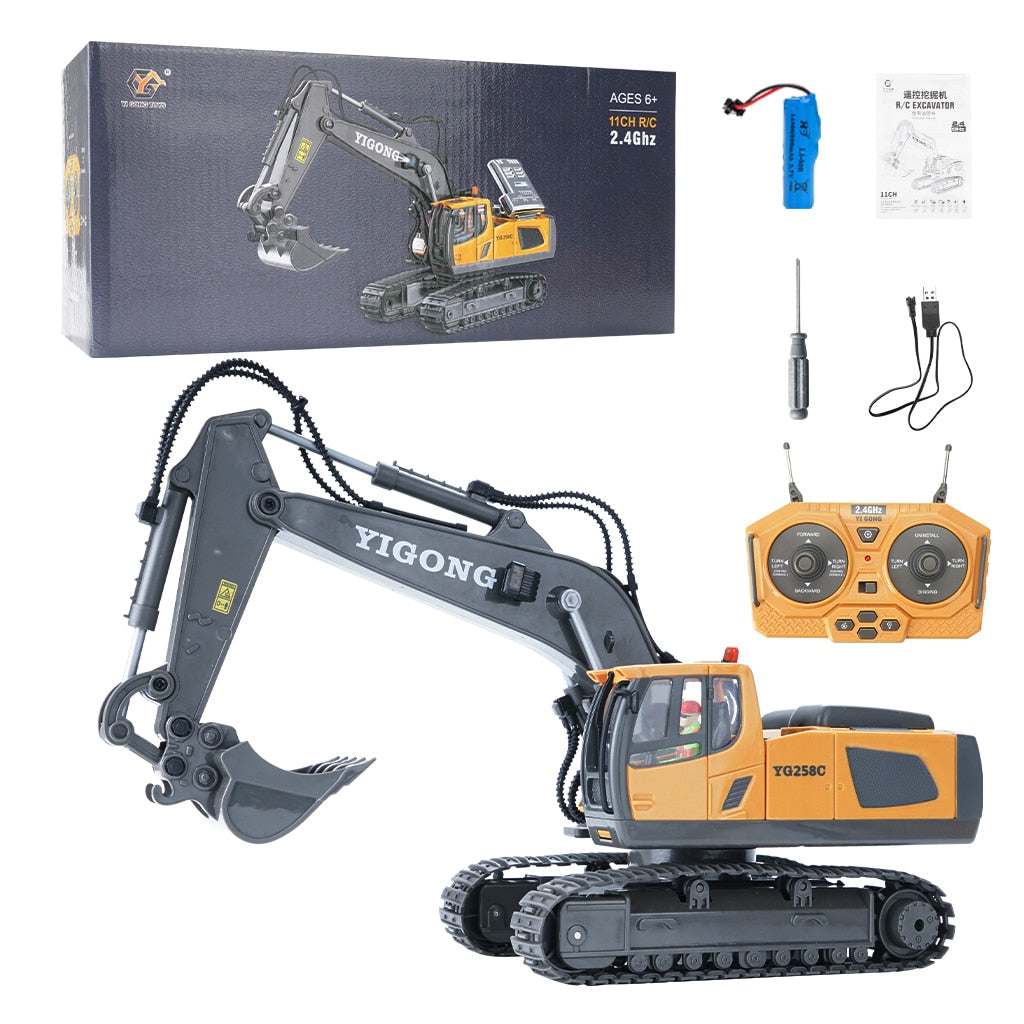Comprehending Just How Excavator Works and Its Influence On Efficiency
Excavators play a vital function in building and mining operations, relying upon an intricate interaction of mechanical and hydraulic systems. Their capability to carry out a variety of jobs depends upon both their style and the technology integrated within. Recognizing these parts can considerably impact functional efficiency and efficiency. As advancements continue to improve the sector, one should take into consideration how these modifications will affect future techniques and efficiency.
The Essentials of Excavator Mechanics

The Role of Hydraulic Equipments in Excavators
At the heart of excavator operation lies the hydraulic system, which plays a crucial duty in powering the equipment's functions and movements. This system utilizes pressurized hydraulic fluid to transfer energy, enabling various actions such as lifting, swinging, and digging. By harnessing the principles of hydraulics, excavators can do tasks with remarkable accuracy and force, boosting total operational efficiency.The hydraulic system consists of crucial parts, including pumps, cylinders, and valves, which interact to regulate the flow and instructions of the liquid. When the driver involves the controls, the hydraulic liquid is guided to details cyndrical tubes, equating the operator's commands right into physical motion. This mechanism allows for responsive and smooth actions, which are important in building and excavation environments. double e volvo rc excavator. The performance of the hydraulic system directly affects the productivity and convenience of the excavator, making it a crucial aspect in modern excavation procedures
Key Elements of an Excavator
Recognizing the crucial elements of an excavator is vital for understanding how this powerful equipment operates. An excavator contains numerous significant components, including the undercarriage, house, container, boom, and arm. The undercarriage offers security and flexibility, typically including tracks or wheels to browse different surfaces. The house has the engine and hydraulic systems, allowing the operator to control activity and power the device. The boom expands from your house, enabling upright reach, while the arm connects to the container, promoting digging and lifting operations.Additionally, the taxicab houses the driver, outfitted with controls for precise handling. Each of these components plays an essential role in the excavator's total functionality, adding to its efficiency and efficiency on construction websites. Recognizing these parts assists in optimizing and preserving excavator performance, making sure tasks are finished safely and successfully.
Accessory Versatility and Its Benefits
Attachment flexibility is a crucial element of excavators, enabling operators to change between numerous devices tailored for particular jobs. This versatility not just improves work effectiveness but likewise adds to cost-effectiveness by decreasing the demand for multiple makers. Understanding the different sorts of attachments readily available can considerably influence the general efficiency and functionality of an excavator on task websites.
Kinds of Attachments
While excavators are mostly identified for their excavating abilities, their real versatility hinges on the large array of accessories offered. These add-ons improve the excavator's capability, allowing it to do various jobs past excavation. Common add-ons include buckets (for excavating and scooping), hydraulic thumbs (for grasping products), and augers (for piercing holes) Grapples are made use of for taking care of and moving debris, while rippers can separate hard surface areas. Other specialized accessories, such as trenchers and plows, allow excavators to adjust to specific job demands. This variety not only boosts the maker's utility across different fields, consisting of building and construction, demolition, and landscape design, yet likewise permits operators to tailor their tools to meet details project demands successfully.
Raised Task Efficiency
Maximizing task efficiency is a main benefit of using various excavator accessories. Different accessories permit an excavator to carry out multiple tasks without requiring to change tools, saving important time and labor. Using a hydraulic hammer can break concrete while a pail attachment can excavate dirt, making it possible for a seamless process. This versatility decreases downtime linked with equipment modifications and improves efficiency on-site. In addition, specialized add-ons improve precision in jobs such as grading or landscaping, causing higher quality results. The ability to adjust to numerous job requirements not only enhances procedures but also reduces the demand for additional machinery, ensuring that projects are completed quickly and successfully. On the whole, add-on flexibility considerably adds to boosted task efficiency in excavation work.
Cost-Effectiveness and Flexibility
Cost-effectiveness is a considerable benefit of making use of versatile excavator accessories. These attachments permit a single excavator to do numerous jobs, reducing the need for additional machinery and labor - double e volvo rc excavator. By switching in between containers, hammers, and grapples, drivers can take on numerous projects, from digging to demolition, thereby making best use of devices application. This adaptability not only decreases functional prices but likewise minimizes downtime linked with changing devices. In addition, the capacity to personalize excavators with specialized add-ons improves efficiency, as they can successfully deal with varied tasks according to project demands. To conclude, the mix of cost-effectiveness and convenience in excavator accessories adds to enhanced operational effectiveness and resource appropriation in building and excavation projects

Advanced Modern Technology in Modern Excavators
Modern excavators are progressively geared up with advanced technology that changes excavation procedures. Automation improves procedures, while boosted gas effectiveness reduces functional expenses. Additionally, clever control systems enhance accuracy and security, marking a substantial development in excavation devices.
Automation in Excavation Processes
As excavation technology advances, automation has arised as an essential element in enhancing effectiveness and precision on work sites. Modern excavators this article are outfitted with sophisticated automated systems that facilitate tasks such as grading, excavating, and trenching with very little driver intervention. These systems utilize sensors, GPS, and artificial intelligence algorithms to assure accurate placing and depth control, substantially minimizing the margin for error. In addition, automation enables operators to concentrate on strategic decision-making instead of manual controls, leading to improved efficiency on the whole. Such developments not just improve operations but also enhance security by lessening human error in complicated procedures. As a result, the assimilation of automation in excavation procedures represents a significant development in building and construction technology, driving the market towards higher performance and effectiveness.
Boosted Fuel Performance
Developments in innovation have actually additionally caused considerable enhancements in fuel effectiveness for contemporary excavators. Modern devices are geared up with advanced engines that optimize power output while lowering gas usage. These engines use ingenious combustion technologies, such as turbocharging and direct gas shot, to improve performance and efficiency. Additionally, light-weight materials in construction lower total weight, permitting much less energy expenditure during visite site operation. The intro of variable rate controls enables drivers to adjust engine performance according to specific jobs, better decreasing gas use. Because of this, these enhancements not only reduced functional expenses but also add to environmental sustainability by lowering exhausts. Generally, enhanced fuel performance in excavators is a crucial advancement that reinforces performance and financial viability in the building and construction market.
Smart Control Systems
While drivers navigate significantly intricate task websites, clever control systems in excavators have arised as necessary tools for boosting effectiveness and precision. These innovative innovations make use of sensing units and algorithms to keep an eye on numerous specifications such as lots weight, surface conditions, and operational efficiency. By immediately readjusting hydraulic functions, clever systems enhance machine performance, resulting in enhanced performance and minimized endure parts. In addition, operators gain from intuitive user interfaces that supply real-time responses and diagnostics, enabling for educated decision-making. This integration of innovation not just enhances operations yet also decreases human error, adding to more secure work atmospheres. As the construction industry proceeds to evolve, clever control systems will play an essential function fit the future of excavator effectiveness and effectiveness.
Enhancing Functional Efficiency With Excavators
Excavators play a crucial function in enhancing operational efficiency across different building and excavation projects. Their convenience enables for numerous tasks, consisting of excavating, material, and lifting handling, which improves operations and lowers the demand for added devices. With powerful hydraulic systems, excavators can do heavy-duty jobs with accuracy, significantly reducing the time required to full jobs. The integration of advanced modern technology, such as general practitioner and automated controls, even more optimizes their procedure, making it possible for operators to achieve better accuracy and lower product waste. Additionally, modern excavators are made to take in less gas and lessen exhausts, adding to both cost financial savings and environmental sustainability. By utilizing excavators effectively, building and construction groups can improve productivity, fulfill project target dates, and enhance overall website management. This multifunctionality and performance make excavators indispensable devices in the modern building and construction landscape.
The Future of Excavators in Building and Mining Industries
As the construction and mining markets develop, the future of excavators is positioned for considerable transformation driven by technical development and transforming functional needs. Advancements in automation and expert system are reshaping excavator abilities, permitting enhanced precision and performance in operations. Self-governing excavators are arising, decreasing the demand for human intervention and lessening the risk of accidents.Moreover, the combination of telematics and IoT technology allows real-time monitoring of maker efficiency and predictive upkeep, enhancing uptime. Environment-friendly designs, consisting of electric and hybrid models, are gaining traction, aligning with sustainability goals within the industry.Additionally, using innovative materials and lighter layouts improves gas performance while see maintaining efficiency criteria. As these trends progression, excavators will play a vital function in fulfilling the increasing needs for performance and safety in building and construction and mining, inevitably transforming operational landscapes.
Regularly Asked Questions
Exactly How Do Climate Condition Impact Excavator Performance?

Climate problems considerably influence excavator efficiency, as rain and mud can prevent traction and stability, while severe temperatures might impact hydraulic systems. Operators must adapt to these variables to assure optimal functionality and safety throughout operations.
What Safety And Security Actions Should Operators Comply With While Using Excavators?
Safety and security procedures for excavator operators consist of using appropriate individual protective tools, carrying out pre-operation inspections, making certain appropriate interaction with ground workers, maintaining a secure range from above hazards, and sticking to recognized functional protocols to avoid crashes.
How Usually Should Excavators Be Maintained for Ideal Efficiency?
Excavators ought to be kept routinely to assure peak efficiency, usually every 250 operating hours or as specified by the supplier. Routine checks improve reliability, stop unforeseen failures, and extend the life expectancy of the tools.
What Is the Average Life Expectancy of an Excavator?
The ordinary life-span of an excavator generally ranges from 10,000 to 15,000 hours of procedure. Variables influencing durability consist of maintenance practices, operating conditions, and the high quality of the maker itself, influencing total productivity and efficiency.

Can Excavators Operate Uneven Terrain Effectively?
Excavators can operate properly on unequal surface due to their expressed designs and flexible tracks. These attributes allow them to preserve security and traction, making it possible for efficient procedure in challenging settings commonly run into in building and landscape design projects. Each of these parts plays a crucial function in the excavator's total performance, adding to its efficiency and effectiveness on building and construction websites. Making the most of work performance is a key benefit of using numerous excavator attachments. While drivers navigate progressively complicated task sites, wise control systems in excavators have emerged as vital devices for improving effectiveness and accuracy. Excavators play an essential duty in boosting functional performance throughout various building and excavation tasks. Advances in automation and artificial knowledge are improving excavator capacities, permitting for improved accuracy and performance in procedures.
Comments on “What Makes the rc excavator Stand Out Among Other Construction Machines”